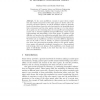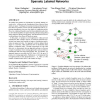1760 search results - page 40 / 352 » Learning from Partial Observations |
116
Voted
AI
2006
Springer
15 years 6 months ago
2006
Springer
So far, most equilibrium concepts in game theory require that the rewards and actions of the other agents are known and/or observed by all agents. However, in real life problems, a...
137
Voted
KDD
2008
ACM
16 years 3 months ago
2008
ACM
We address the problem of classification in partially labeled networks (a.k.a. within-network classification) where observed class labels are sparse. Techniques for statistical re...
95
Voted
NIPS
2004
15 years 4 months ago
2004
We prove generalization error bounds for predicting entries in a partially observed matrix by fitting the observed entries with a low-rank matrix. In justifying the analysis appro...
125
click to vote
PERCOM
2007
ACM
16 years 2 months ago
2007
ACM
We consider sensor scheduling as the optimal observability problem for partially observable Markov decision processes (POMDP). This model fits to the cases where a Markov process ...
143
Voted
ICTAI
2007
IEEE
15 years 9 months ago
2007
IEEE
We review a method of generating logical rules, or axioms, from empirical data. This method, using closed set properties of formal concept analysis, has been previously described ...



